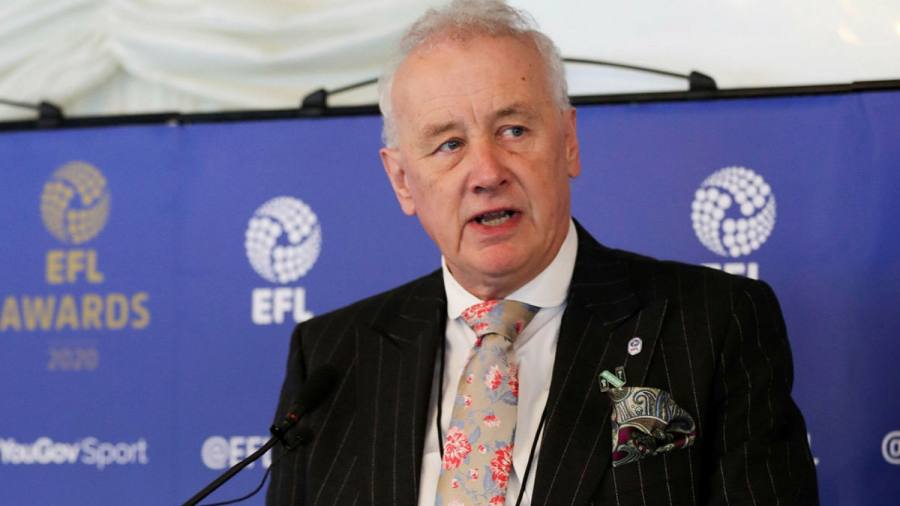[ad_1]
Rick Parry, chairman of the English Football League, has warned that a ban on gambling sports sponsorship would be “catastrophic†for smaller clubs already struggling to survive because of the pandemic.
Teams are facing potential sponsorship curbs as part of a wide-ranging UK government review into gambling legislation expected to be completed in the coming weeks. Anti-gambling activists say the close association of football with betting companies has contributed to a rise in gambling addiction and promoting the practice to children.
But Parry, who leads the body that runs the three divisions below the Premier League, told the Financial Times: “There’s no evidence to suggest that banning sponsorship will reduce the prevalence of problem gambling.â€
The EFL, itself sponsored by Flutter-owned gambling group Sky Bet, is readying evidence to submit to the review. Parry said he believes the EFL will be able to make a “very good case†that the rise of betting sponsorship in football has not led to an increase in problem gambling.
Shirt sponsorships are among the biggest commercial deals available to football clubs. More than £40m of annual revenue is at stake for the EFL’s 72 clubs, money they could “ill-afford to loseâ€, Parry said.
The pandemic has wiped out ticket sales, which accounted for just over a fifth of Championship clubs’ £785m revenues in 2018/19, according to Deloitte. Commercial revenues represented a quarter of the total. Half of the division’s 24 clubs have gambling groups as their main shirt sponsor.
“In the wake of the pandemic it would be catastrophic,†Parry said of a potential ban.
Gambling operators, football clubs and leagues should be free to enter commercial partnerships, he added.
Executives at leading clubs expressed concern over the loss of a vital revenue stream at a time when ministers have refused to support the game during the pandemic. So far, professional men’s football has been left out of the £600m government bailout for UK sports.
“This government is guilty of snobbery towards football,†said one EFL club investor.

The Premier League declined to comment, but one club chief executive stressed that a ban would be “harder for smaller clubs because it’s easy moneyâ€. Yet Parry pointed out that a ban was “not a foregone conclusionâ€.
A person close to the government said the review would consider all evidence before any decision on shirt sponsorship is made.
The potential crackdown, as part of the review of the Gambling Act 2005, comes after the government slashed the maximum stake on high speed slot machines in betting shops by 98 per cent to £2. The House of Lords last year recommended that bookmakers should not be able to advertise inside sports venues or on football shirts.
Campaigners say the tie-ups normalise gambling among children and use football to reel in young men, who are then cross-sold a range of casino-style online games which they say are more addictive. There are roughly 300,000 problem gamblers in England, according to the NHS.
“Unless you were somehow able to measure it among a controlled group of people who had grown up never having been exposed to gambling advertising, it would be impossible to empirically prove its impact on rates of gambling harm,†said Matt Zarb-Cousin, Campaign For Fairer Gambling.
“The point is it’s normalising gambling among children and young people, who are most vulnerable to addiction.â€
Finances at lower league clubs are already fragile. Most teams in the Championship, English football’s second tier, are lossmaking, paying 107 per cent of revenues in wages in the 2018/19 season, according to Deloitte.
There are reputational risks for clubs closely associated with gambling. Last week, betting “stock market†Football Index collapsed into administration after facing heavy criticism for reducing the dividends paid on players’ performance, leading to the value of so-called shares to crash and prompting punters to complain on social media of major losses. It said it had changed its dividend policy after incurring “substantial losses†in recent months.
Football Index was the shirt sponsor of Championship clubs Nottingham Forest and Queens Park Rangers. Both clubs have said they will remove the betting company’s logo from their shirts with immediate effect.
Entain, one of the world’s largest gambling groups and owner of the Ladbrokes and Partypoker brands, supports a ban on shirt sponsorship, though Rob Hoskin, chief governance officer, said there was “still a place†for gambling groups to sponsor sport, such as at the grassroots level.
Yet rival Kindred, the owner of 32 Red, which sponsors several clubs including Derby County, has argued that the industry is “stigmatised†in the debate.
The company said last month that 4 per cent of its revenue comes from “high-risk†players who show signs of addiction. Neil Banbury, UK general manager, said at the time: “ultimately shirt sponsorship is a bit of a red herring in the debate around problem gambling.â€
Dan Waugh, an analyst specialising in gambling regulation at consultancy Regulus Partners, said smaller clubs would struggle to find alternative sponsors willing to pay as much as betting companies.
“It’s not as clear that you would have big businesses stepping up to fill the gap,†he said. “They are not the same as the Premier League in terms of global marketplace.â€
Weekly newsletter

Scoreboard is the Financial Times’ new must-read weekly briefing on the business of sport, where you’ll find the best analysis of financial issues affecting clubs, franchises, owners, investors and media groups across the global industry. Sign up here.
[ad_2]
Source link






